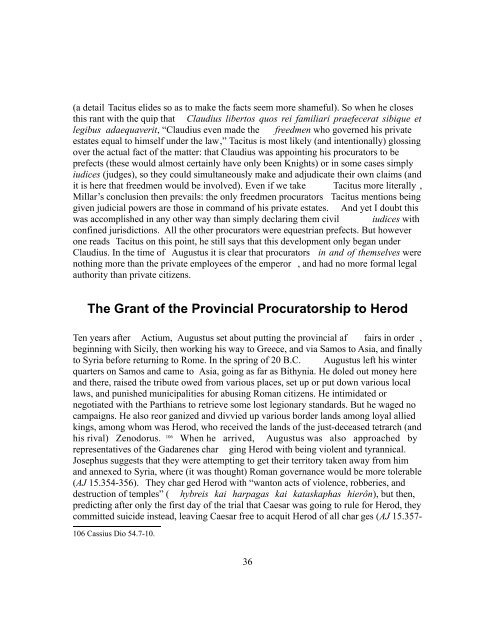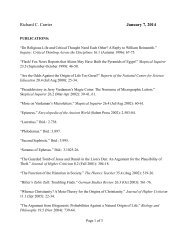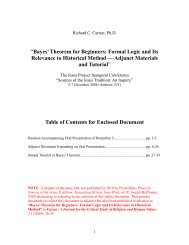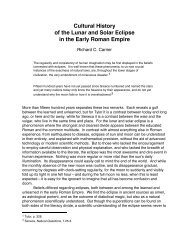Herod the Procurator - Richard Carrier
Herod the Procurator - Richard Carrier
Herod the Procurator - Richard Carrier
Create successful ePaper yourself
Turn your PDF publications into a flip-book with our unique Google optimized e-Paper software.
(a detail Tacitus elides so as to make <strong>the</strong> facts seem more shameful). So when he closes<br />
this rant with <strong>the</strong> quip that Claudius libertos quos rei familiari praefecerat sibique et<br />
legibus adaequaverit, “Claudius even made <strong>the</strong> freedmen who governed his private<br />
estates equal to himself under <strong>the</strong> law,” Tacitus is most likely (and intentionally) glossing<br />
over <strong>the</strong> actual fact of <strong>the</strong> matter: that Claudius was appointing his procurators to be<br />
prefects (<strong>the</strong>se would almost certainly have only been Knights) or in some cases simply<br />
iudices (judges), so <strong>the</strong>y could simultaneously make and adjudicate <strong>the</strong>ir own claims (and<br />
it is here that freedmen would be involved). Even if we take Tacitus more literally ,<br />
Millar’s conclusion <strong>the</strong>n prevails: <strong>the</strong> only freedmen procurators Tacitus mentions being<br />
given judicial powers are those in command of his private estates. And yet I doubt this<br />
was accomplished in any o<strong>the</strong>r way than simply declaring <strong>the</strong>m civil iudices with<br />
confined jurisdictions. All <strong>the</strong> o<strong>the</strong>r procurators were equestrian prefects. But however<br />
one reads Tacitus on this point, he still says that this development only began under<br />
Claudius. In <strong>the</strong> time of Augustus it is clear that procurators in and of <strong>the</strong>mselves were<br />
nothing more than <strong>the</strong> private employees of <strong>the</strong> emperor , and had no more formal legal<br />
authority than private citizens.<br />
The Grant of <strong>the</strong> Provincial <strong>Procurator</strong>ship to <strong>Herod</strong><br />
Ten years after Actium, Augustus set about putting <strong>the</strong> provincial af fairs in order ,<br />
beginning with Sicily, <strong>the</strong>n working his way to Greece, and via Samos to Asia, and finally<br />
to Syria before returning to Rome. In <strong>the</strong> spring of 20 B.C. Augustus left his winter<br />
quarters on Samos and came to Asia, going as far as Bithynia. He doled out money here<br />
and <strong>the</strong>re, raised <strong>the</strong> tribute owed from various places, set up or put down various local<br />
laws, and punished municipalities for abusing Roman citizens. He intimidated or<br />
negotiated with <strong>the</strong> Parthians to retrieve some lost legionary standards. But he waged no<br />
campaigns. He also reor ganized and divvied up various border lands among loyal allied<br />
kings, among whom was <strong>Herod</strong>, who received <strong>the</strong> lands of <strong>the</strong> just-deceased tetrarch (and<br />
his rival) Zenodorus. 106 When he arrived, Augustus was also approached by<br />
representatives of <strong>the</strong> Gadarenes char ging <strong>Herod</strong> with being violent and tyrannical.<br />
Josephus suggests that <strong>the</strong>y were attempting to get <strong>the</strong>ir territory taken away from him<br />
and annexed to Syria, where (it was thought) Roman governance would be more tolerable<br />
(AJ 15.354-356). They char ged <strong>Herod</strong> with “wanton acts of violence, robberies, and<br />
destruction of temples” ( hybreis kai harpagas kai kataskaphas hierôn), but <strong>the</strong>n,<br />
predicting after only <strong>the</strong> first day of <strong>the</strong> trial that Caesar was going to rule for <strong>Herod</strong>, <strong>the</strong>y<br />
committed suicide instead, leaving Caesar free to acquit <strong>Herod</strong> of all char ges (AJ 15.357-<br />
106 Cassius Dio 54.7-10.<br />
36








